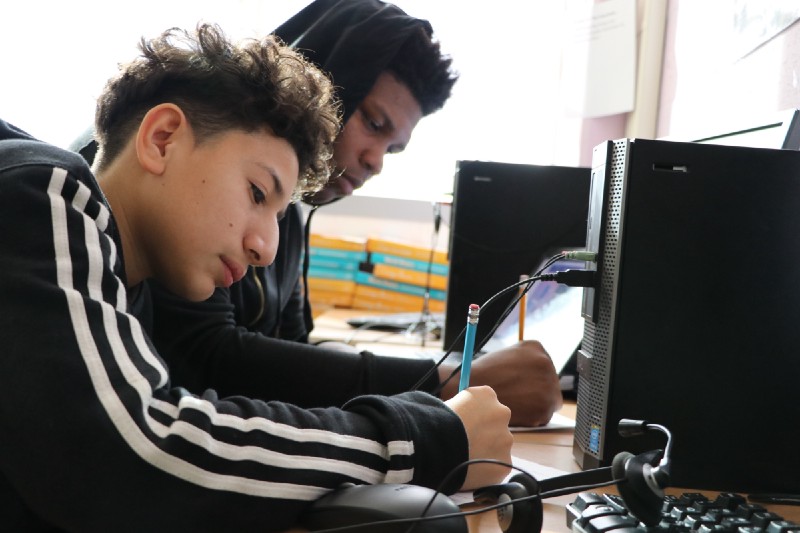by Averill Kelley, Las Vegas, Nevada
For the past ten years, I have taught civics in a large urban school district. Throughout this time, I have worked at several large, at-risk, Title 1, turnaround or transformational, comprehensive or magnet high schools serving Black and Latinx students from low-income neighborhoods.

As a social studies teacher of color, it is my personal conviction that civics is the most important class students take during their K-12 education. In civics, students learn important 21st century skills such as critical thinking, collaboration, communication, information technology, media literacy, civil discussion, debate, and compromise. In order for my students to master these skills in my classroom, I purposefully employ an inclusive, equitable, culturally-relevant approach that presents and honors diverse perspectives. I work hard at it, and it requires a lot of reflection and willingness to grow, but I believe it to be the right thing to do.
In a traditional civics course, students learn about the philosophical and historical foundations of American government, which focuses on the contributions of elite White men. The curriculum demonstrates how the Framers fought for independence, founded the United States, and drafted our Constitution as saviors of democracy and bearers of republican governance. Students also learn the structure of government and explore a range of topics such as mass media, interest groups, political parties, and public opinion. Typically, it is not until they reach units on civil rights and civil liberties that students are finally able to learn about the contributions from communities of color, and how they used their constitutional rights to fight for full citizenship.
Sadly, in most civics classrooms across the United States, we find little focus on diversity, equity, and inclusion, making it difficult for many students to feel that their voices, opinions, or perspective matter. They do not see themselves in the curriculum, and they are not inspired to engage in the system. Therefore, in my work, I have begun to consider how civics might go beyond content to position students as civic agents with meaningful lived experiences, important contributions, and endless potential.
To guide my thinking about diversity, equity, and inclusion in the civic education of Black and Latinx students, I have formulated the following three questions:
- What kind of civic learning experiences are useful for Black and Latinx students in low-income areas?
- How do we effectively integrate civic knowledge and competence with justice-oriented action?
- What can teachers of color and White teachers do to improve how we teach civics to Black and Latinx students in low-income areas?
Below I expand on some of the ways in which I am addressing these questions.
First, Black and Latinx students, especially those in low-income areas, need to see civics as useful to them. The civics curriculum must therefore be relatable, meaningful, and focused on the needs and interests of their communities. This can begin by talking to students about their personal experiences with government — and just listening when someone inevitably shares a less than rosy story. This is how you show them that civics is about them and that your civics course will be about their relationship with government. More importantly, this is how you can work to gain their trust.
Oftentimes, educators in Black and Latinx communities tell me that they shy away from certain types of instructional activities. Their reasons vary — the students can’t do a certain activity; the students won’t do a certain activity; I might lose control of the students — but it’s easy to see the common thread woven throughout. The students are the problem. They are not capable or, worse, we think they are not worthy.
This, my friends, is what we call the civic opportunity gap: the reality that Black and Latinx students from low-income communities are less likely to receive opportunities to engage in high-quality civic learning experiences than their peers from while, middle- and upper-class communities.
This is not acceptable. As educators, we must evaluate our biases and assumptions about the motivations and abilities of students. We must especially take stock of the oftentimes invisible ways in which race can influence our beliefs about what students can and cannot do. While students are in my classroom, I continue to look for opportunities for advanced civic learning. My students should be afforded the same level of rich engagement and civic learning as the students across town. This can be as simple as providing time and space for them to discuss current events in the context of their own lived experiences or researching a community problem that they choose based on their own interests and concerns. It can also be as exciting as supporting your students’ desire to protest a new school policy or advocate for a new local ordinance. It can be in the confines of the classroom or outside of them. What matters is that these experiences are facilitated by the careful guidance of a professional educator and that all students have access to these kinds of student-centered activities.
Second, in the 21st-century classroom, it is imperative for educators to effectively integrate civic knowledge and competence with justice-oriented action. It is not enough to merely teach civics content to students from Black and Latinx communities. They must also be taught how to engage in civic life, how to work through government systems to affect change, and how to seek justice for themselves and their communities.
Students care about their communities. They want to have a positive impact on the people and places around them. But nobody is born knowing how to do that. We must teach students to articulate their concerns, collaborate with others to determine viable solutions, and ultimately engage with the appropriate institutions to implement those solutions. This is most frequently done at the local level, and educators would be wise to seek opportunities for students to engage with the countless individuals, organizations, and civic bodies in their communities that share their concerns.
In addition to the political agency, students will surely feel upon seeing the impact of their actions, they also gain important skills such as researching problems, collecting evidence, building arguments, working with others, and effectively communicating a position. And teachers don’t have to design these experiences on their own. There are many high-quality programs such as iCivics, We the People, Project Citizen, Mikva Challenge, and Generation Citizen that have curricular resources and other forms of support to teach the process and guide students through it.
Many of these programs are aligned to state social studies standards, common core standards for literacy, and the College, Career, and Civic Life (C3) Framework. They provide curriculum, tools, and other resources to support teachers as they help their students through the process and ultimately help them to see the connection between their learning and what happens in the real world. These programs also help to improve and promote the voices of Black and Latinx students in low-income areas. As one example, educators can invite Black and Latinx community leaders into the classroom to discuss the ways in which they seek to have a positive impact
Third, all teachers, regardless of race or ethnicity, must intentionally work to improve their teaching for Black and Latinx students. Teachers can begin by deliberately working to establish a classroom environment that builds trust, offers intellectual safety, and respects student views and contributions. Then, they must place students at the center of the curriculum and all learning opportunities. Instead of being the expert, teachers should listen deeply and learn alongside their students by participating in honest and critical thinking. They should encourage students to choose their own topics, conduct their own research, and challenge the statements presented by textbooks and teachers. This, in turn, will build student interest, cultivate their confidence, and ultimately inspire and empower positive civic action.
I would be remiss in concluding this post without an important point about the teacher workforce in America. Simply put, we need more teachers of color. And this isn’t about optics or more employment opportunities for Black and Latinx adults. This is about the kids. The kids need civic role models with whom they can identify. They need teachers who look and talk like them and care about the same issues as they do. And the benefits go beyond the development of positive civic dispositions. Research has demonstrated that black students who have black teachers are met with higher expectations from those teachers, are suspended less often, and have better academic outcomes.
I love teachers. And I very much believe that the overwhelming majority of them are committed to providing the best possible learning environment and experiences for all of their students. But just as students must be trained to be effective civic actors, teachers must be trained to be effective civic educators. And if that training does not promote diversity, equity, and inclusion, and if it doesn’t include opportunities for teachers to explore culturally-relevant pedagogies, then it is incomplete. It is inadequate. It is undemocratic.

Averill Kelley a ten-year veteran social studies teacher in the Clark County School District in Las Vegas, NV where he teaches U.S. History, U.S. Government, and AP Government and Politics. He is also a full-time doctoral student at the University of Nevada, Las Vegas where he studies Curriculum and Instruction with an emphasis in Cultural Studies, International Education, and Multicultural Education. His research interests center around social studies teachers of color and civics education and engagement of students of color.
— — — — —
The views expressed in this blog reflect the views of the author alone and do not reflect the views of the CivXNow Coalition or iCivics. CivXNow and iCivics do not endorse, verify or represent the accuracy, completeness or reliability of any opinion, statement, recommendation or other information written by a third party and published on the CivXNow blog.


 See All
See All